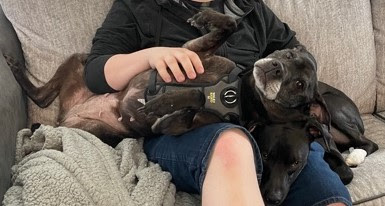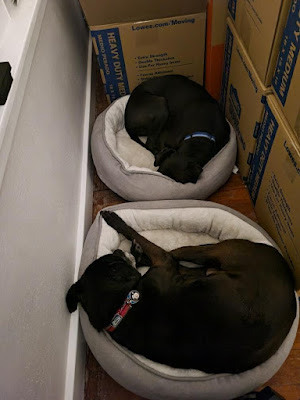Adoption Options: All About Animal Rescues
Have you ever wondered what the difference is between animal shelters, rescues, and breeders? Have you heard of puppy mills but don't know what they actually are? Wondering if it's safe to buy a pet online? Are you considering bringing a pet into your family, but don't know where to look? This series is for you! Welcome to part 2 of our 5-part series, Adoption Options.
So what's the big deal with shelters vs. rescues vs. breeders? Many people have strong opinions on this topic, but we aren't here to convince you one way or the other. All options are giving animals who don't have a home, a home, and that's a wonderful thing. This series is here to educate people about the main forms of obtaining animal companionship so folks can make their own educated decisions about what's the best fit for their lifestyle, family, and situation.
Animal rescues
 |
| Fred is a young Pit-Amstaff rescue dog. He loooooves cuddles. |
What are they?
 |
| Fred likes naps, going on walks, and sniffing things vigorously. |
Animal rescues sometimes focus on helping certain breeds. For example, there are lots of Pit bull rescues in the United States. There are other rescues that focus on age, like senior animals, who have a harder time getting adopted. Still other rescues focus on finding forever homes for disabled animals. People who foster animals for specialty-focused rescues often have a passion for the specific breed or type of animal, which means you know they're very likely in good hands. If you're looking for a purebred dog or puppy and want to avoid puppy mills, one option to consider is adopting from a breed-specific rescue. The AKC Rescue Network is another great resource for finding a purebred animal to rescue.
Rescue animals are typically very well-treated and looked after. They are usually healthy, spayed or neutered, and fully vaccinated. If this is not the case, there is a complete health record showing what else the animal needs upon adoption. Animal rescues can also sometimes secure discounted veterinary rates for those who adopt a rescue animal.
 |
| Ava is Fred's best friend. She was adopted from a shelter. |
The adoption process
 |
Fred folds himself up for a nap in a cozy corner of the couch. |
 |
| Fred and Ava love cuddles! |
Things to keep in mind
 |
| Ava resting after a nice walk. |
Interview with Shawn, adopter of Ava (shelter) and Fred (rescue) the dogs
What made you decide to get a second dog after you adopted Ava?
"I lived in a decent house at the time, and Ava is getting older and I wanted her to have someone to play with. I had a big yard and thought it was a good time to get her a friend. This was pre-pandemic. I looked at a couple of rescue dogs in Minnesota and went down to meet Fred. He kinda just was really cool. He played with me, chewed my hand, and laid on my lap."
 |
| Fred and Ava love doing nearly everything together |
What made you decide to adopt from an animal rescue?
"I wanted a Pit rescue because I know how rough it is for Pits. Not a lot of people are looking for them or want to adopt them. I went out of my way to find a Pit and give one a good home. I went to Minnesota Pit Rescue. Most of the shelters around here still have stigma around bully breeds, so not a lot of shelters have them.
Fred came out of Texas, some shelters down there are overrun with Pit pups. Fred's mom met up with a non-Pit dog and had a litter of mutts. Nobody in that part of Texas wanted Pit mixes. They either get adopted from rescues or most get euthanized. It's not their fault they came from a mill. If you're good to them and they're good to you, it's a good experience."
Tell me all about the process. What was the first thing that happened?
"I went online and looked up Pit bull rescues in Minnesota. I came across Minnesota Pit Rescue. There were a couple of organizations I was looking at, but this one was pulling Pits out of bad breeders and puppy mills in Texas. That's something I can get behind. I went on their website and there were a couple of dogs I took a remote fancy to. I applied for one of the dogs, but it turned out that dog was already adopted. I applied for another one Fred."
 |
| Fred tore his nail and does not like the temporary bandage! (He went to the vet shortly after.) |
"They ran a criminal history check, a credit check, and a background check, like when you get an apartment. If you pass, they invite you to visit the foster home. I met with the foster parents and had a little intro with Fred. It went well. After the meeting, the foster parents contacted the Minnesota Pit Rescue people and let them know how they felt about me. Once that was done, a week or two later the rescue got in touch with me to finalize everything. I paid the adoption fee and finished up paperwork.
One of the foster parents happened to have family where I lived, so she drove Fred up herself. Otherwise I would have picked him up.
They did a home inspection before officially finalizing the adoption. They wanted to make sure Fred wouldn't be in a small studio with no yard because dogs have lots of energy. I had a half-acre backyard fenced in, ample space for him to stretch his legs and run and burn off energy. They made sure it was a good place for him, clean and generally doing their due diligence. It doesn't benefit anybody for a rescue dog to return to the rescue. They wanna make sure it is a forever home for this animal. It's not fair for the animal to bounce between families, it's not fair to the foster family. These animals have already had bad luck, the foster families want to make sure they have the best environment possible."
 |
| Fred's first cone! (So he wouldn't chew on the aforementioned injured paw.) |
When did Fred and Ava meet?
"Fred and Ava met when Fred was dropped off. The foster parent supervised a little. She came in and we sat down with the dogs make sure they got along. After first 5-10 minutes, they were ok. They were smelling each other and started playing. Ava was 9-10 at the time, Fred was 4-5 months old. She put him in his place a few times, set boundaries, but they've been good ever since."
Was Fred vaccinated and neutered before you adopted him?
"He was vaccinated and he was neutered prior to coming into the house. A lot of that was included in the cost. It was $400 for the adoption. The younger they are, the more expensive they are. He had no training when I got him, so we've been working on that. They require certain breeds to get training, at least at Minnesota Pit Rescue."
Would you recommend adopting from a rescue to others?
"I would."
Conclusion
 |
| Fred and Ava love their human more than anything. |
Photo credit: Shawn Cruze and Skye I. R. Iwanski
Series Sources:
Admin. “Survey Reveals Misconceptions about Purebred Dogs in Animal Shelters.” American Kennel Club, 14 July 2015, www.akc.org/clubs-delegates/government-relations/government-relations-blogs/survey-reveals-misconceptions-purebred-dogs-animal-shelters/.
Cyrenne, Suzie. “Animal Rescue and Animal Shelter: What Is the Difference?” HomeoAnimal.com, 2019, www.homeoanimal.com/blogs/blog-pet-health/81114180-animal-rescue-and-animal-shelter-what-is-the-difference.
Gorey, Megan. “The Differences: Animal Control Vs. Humane Society.” WCYB, WCYB, 20 Dec. 2011, www.wcyb.com/features/weekend-drive/the-differences-animal-control-vs-humane-society.
“Federal Licensing & USDA Standards.” ASPCA, https://www.aspca.org/barred-from-love/laws-rules/federal-licensing-usda-standards.
“How to Find a Responsible Dog Breeder.” The Humane Society of the United States, www.humanesociety.org/resources/how-find-responsible-dog-breeder#:~:text=You%20can%20find%20responsible%20breeders,or%20visiting%20professional%20dog%20shows.
Kleinfeldt, Alexandra. “Overview of Animal Euthanasia.” Animal Law Legal Center, Michigan State University College of Law, 2017, www.animallaw.info/article/overview-animal-euthanasia.
“Rescue vs Shelter vs Breeder Pet: Which Is Right For You?” My Pet Cab, Starwood Animal Transport Services, 4 Nov. 2020, www.mypetcab.com/blog/rescue-vs-shelter-vs-breeder-pet.
Sharma, Arvind, et al. “The Management of Cow Shelters (Gaushalas) in India, Including the Attitudes of Shelter Managers to Cow Welfare.” Animals : an Open Access Journal from MDPI, MDPI, 28 Jan. 2020, www.ncbi.nlm.nih.gov/pmc/articles/PMC7070297/.
The Shelter Pet Project, theshelterpetproject.org/.
“Understanding Your Local Government & Animal Control.” Alley Cat Allies, www.alleycat.org/resources/guide-to-local-government-animal-control/.



Comments
Post a Comment